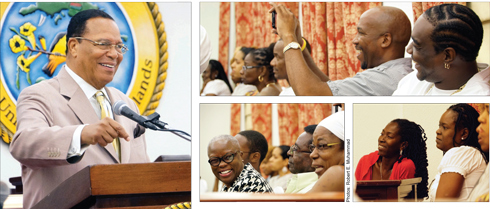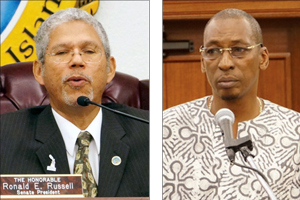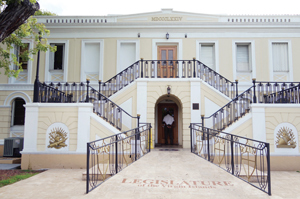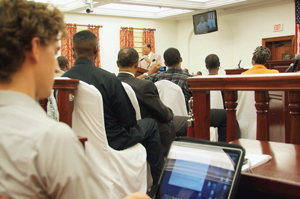Caribbean welcomes Minister Farrakhan
By A. Akbar Muhammad | Last updated: Dec 11, 2012 - 1:16:10 PMWhat's your opinion on this article?

The Honorable Minister Louis Farrakhan speaks in the Virgin Islands. Photos: Robert E. Muhammad
|
Illness brings tour to close, but not before great success
CHRISTIANSTED, St. Croix (Finalcall.com) - The Honorable Minister Louis Farrakhan was forced to shorten his trip in the Caribbean at the recommendation and insistence of doctors who said he was suffering from exhaustion, dehydration and a urinary tract infection. His family concurred with the advice of the doctor after the minister was taken to a St. Thomas hospital for tests.

(L) Hon. Ronald E. Russell, senate president (R) Senator Usie R. Richards
|
As Minister Farrakhan is a man known to be transparent concerning his health conditions and challenges, he insisted—along with his sons and staff—that the Nation and the public should be fully informed about what the health challenges were that caused him to postpone his Caribbean tour and return home Dec. 7.
After addressing mainly elected officials and some members of the public at the Ottley Legislative Hall in St. Thomas, U.S. Virgin Islands, Minister Farrakhan agreed that he needed to suspend his tour. The tour of the Caribbean, which began Nov. 21, was cut short on Dec. 4. The Minister was advised to postpone visits to St. Croix, Belize and Nassau. The tour is to be resumed, however, and these visits completed in the future.

The Virgin Islands legislative building.
'All economics starts with land. If you have land, why would you let others come and take it from you and marginalize you on your own land? In the Caribbean we are being marginalized, and we are marginalizing ourselves.' |
Although in weakened health, the 79-year-old leader spoke straight and candid words about the present state of the region and a vision for Caribbean unification and self-determination. He emphasized the need to control land and industry to allow the region to feed itself; breaking the current arrangement of importing food from outside places like the United States.
“All economics starts with land,” said Minister Farrakhan. “If you have land, why would you let others come and take it from you and marginalize you on your own land? In the Caribbean we are being marginalized, and we are marginalizing ourselves,” he argued.
The Minister has been a strong voice for an independent Caribbean in line with his teacher the Most Honorable Elijah Muhammad who warned the British wanted to form a federation of all their colonies in the Caribbean, however for further subjugation.
Leaders like Jamaica independence champion Norman Manley and former Trinidad Prime Minister Dr. Eric Williams struggled for the idea of unification, but it died on the vine because it was not time. But on the course of five trips this year, Minister Farrakhan has declared that “it’s time now” for the whole Caribbean to unite into “one mighty nation” with everything needed to make the Caribbean strong, viable and powerful.
Though there are some who gave up on unity, the concept has been on the world stage for some time. In July 2009 Muammar Gadhafi chartered a plane to fly in all the Caribbean Heads of Government to an African Union Summit in Sirte, Libya to seriously discuss the question of unification. The late revolutionary leader was prepared to back the realization of the idea with resources and help change the economic inequity between the region and its former colonial/slave masters.
After leaving the Legislature chambers, Minister Farrakhan journeyed to the University of the Virgin Islands where the president, Dr. David Hall, held a luncheon for the Minister, his delegation and the brothers and sisters who traveled to the Virgin Islands to assist on the tour.

The Minister speaks to those within the legislative chambers.
|
He had extremely successful, but very challenging visits to four countries before St. Thomas. First was the Island of Grenada—known throughout the Caribbean and world as a spice island—where he appeared on several television and radio shows continuing his message of self determination and unity.
There the Muslim leader held audience with Grenada Prime Minister Tillman Thomas and Grenada’s opposition Leader and Former Prime Minister Dr. Keith Mitchell. Both men were exposed to Minister Farrakhan as students in the 1970s on college campuses and radio broadcasts; this was a constant note among various Caribbean leaders on the tour.
“I grew up on Minister Farrakhan,” Prime Minister Thomas told us, describing how his consciousness was raised going back to 1972. As a student at New York’s Fordham University, every Sunday he tuned in to Minister Farrakhan’s live weekly radio broadcast from Harlem Mosque No. 7.
The prime minister graciously thanked the Minister for his consistency and longevity in making Black people feel better about self and doing something for self.
Dr. Mitchell, the island’s main opposition leader and Grenada’s longest serving prime minister from 1995-2008, attended the Minister’s lectures while enrolled at Howard University and also listened to Minister Farrakhan on radio and audio tapes. Another example of Minister Farrakhan’s early influence on current leaders was revealed in a chance meeting with Dr. William Warren Smith, president of the Caribbean Development Bank, while departing from an airport. Dr. Smith first words to the Minister was that as a Cornell University student in 1971, “I heard you speak and I never forgot that day … you spoke to the students at Cornell.”
While on the island, Minister Farrakhan spoke at the Grenada Trade Fair where the masses of people poured into a center to hear him. One frequent question asked by Grenada media outlets concerned Malcolm X, whose mother originated from the island. Malcolm X’s father Earl Little—a follower of Marcus Garvey—met his mother in Montreal, Canada as an immigrant from Grenada, according to the landmark book, “The Reinvention of Malcolm X” by the late Dr. Manning Marble. On two occasions when Malcolm’s name was mentioned, once on TV and once on radio, Minister Farrakhan stated that the history of Malcolm and that period in the Nation of Islam history actually gave him chills. He made a few remarks about healing and made a comparison with the healing in Grenada vis-a-vis the death of revolutionary leader Maurice Bishop and that turbulent period in Grenada’s history. According to one of Minister Farrakhan’s interviewers, Dr. Betty Shabazz was in Grenada three months before her tragic death in a fire.
While in Grenada, Minister Farrakhan made a visit to the 1983 execution site of one of the bright stars and sons of the Caribbean, Prime Minister Maurice Bishop. He was educated abroad and was influenced by the Black Power movement of America.
In March 1979, a coup d’état was organized that overthrew the government of longtime leader Eric Gairy and the New Jewel Movement came to power. By 1983, there arose some internal contradictions within the New Jewel Party which opened the door for U.S. President Ronald Reagan to send in troops under false political pretexts of Communist threats. Because of the internal contradictions and disagreements within the party, on October 19, 1983, Maurice Bishop and 12 of his supporters were assassinated. Six days later, on October 25, 1983, the United States seized the country. The body of Prime Minister Bishop was never found.
Minister Farrakhan and his delegation stood where bullet holes still pierce the wall where these young men were killed. Like Minister Farrakhan, Maurice Bishop’s vision was to form a federation with St. Vincent and the Grenadines, Dominica and St. Lucia.
The Grenada government provided security and protocol assistance to do whatever was necessary to assure the Minister’s schedule ran smoothly. The love, respect and warm reception of Minister Farrakhan throughout the trip was easily felt.
Several brothers and sisters journeyed from cities across America to assist the Minister and his delegation with logistics, security and going into the streets to acquaint the people with the Muslim leader. The younger generation under 30 years of age in Grenada had very little to no knowledge about Minister Farrakhan and his work throughout the Caribbean; but Muslim men and women engaging people in the streets was an awesome sight to the citizens of Grenada who would stop and ask questions as we invited them to hear Minister Farrakhan.
A second part of this report will cover Minister Farrakhan’s impact on the island of Barbados.
(For comments or questions please reach A. Akbar Muhammad at [email protected].)
INSIDE STORIES AND REVIEWS
-
-
About Harriett ... and the Negro Hollywood Road Show
By Rabiah Muhammad, Guest Columnist » Full Story -
Skepticism greets Jay-Z, NFL talk of inspiring change
By Bryan 18X Crawford and Richard B. Muhammad The Final Call Newspaper @TheFinalCall » Full Story -
The painful problem of Black girls and suicide
By Charlene Muhammad -National Correspondent- » Full Story -
Exploitation of Innocence - Report: Perceptions, policies hurting Black girls
By Charlene Muhammad -National Correspondent- » Full Story -
Big Ballin: Big ideas fuel a father’s Big Baller Brand and brash business sense
By Bryan Crawford -Contributing Writer- » Full Story






 Click Here Stay Connected!
Click Here Stay Connected!








